How far the Church has come this past year
For many Catholics these days, bishops are like members of Congress. We may like ours but distrust the lot of them. To judge from the reaction of social media to the U.S. bishops' June meeting, not a few tweeters think they should all go for a swim with a millstone.
The news coverage this past year has not been much kinder.
When any subject is covered closely, there tends to be an undercurrent of impatience in the tone of much of the reporting. Why hasn't the Church fixed this problem? Why isn't it doing something now?
This impatience is particularly understandable when expressed by survivors of sexual abuse, who have often carried the secret with them for decades and rightly want resolution.
It doesn't help that Church time is not like ordinary time. It is the world's first global bureaucracy. It is mindful of its responsibilities to safeguard what has been entrusted to it.
And it is inherently cautious when it comes to quick movements in any direction. It measures progress in decades and centuries. It outlasts dictators and empires and perhaps some worthwhile reforms as well.
Which is what makes the past year really quite remarkable. In Church time, it has been moving at breakneck speed.
In 2018, Pope Francis began the year by defending a now discredited Chilean bishop. The pope had clearly been misinformed about the culpability of a Chilean priest-abuser and a bishop's related cover-up.
Months later, the news came out about then-Cardinal Theodore E. McCarrick. An investigation by the Archdiocese of New York found that charges of sexual abuse against him were credible and substantiated.
These two events set in motion a series of actions that were both unpredictable and far-reaching.
In the case of Chile, Pope Francis sent his own team to investigate. Their devastating report led to all the Chilean bishops offering their resignations, Pope Francis apologizing for his comments, and the priest being defrocked.
Since the McCarrick revelations, there has been an internal Vatican investigation that, while not yet public, has led to a rare laicization of a cardinal. He is Mr. McCarrick now.
In addition, the pope held an unprecedented meeting of the presidents of the world's national bishops' conferences in Rome in February to discuss the crisis of clergy sexual abuse of minors and vulnerable adults.
This meeting, which sought to get the whole church up to speed on the issue of clergy sexual abuse and the temptation to cover up such abuse, led in turn to a papal decree establishing new church laws governing abuse.
While Popes John Paul II and Benedict XVI also wrestled with this issue, the laws issued by Pope Francis clearly reflected the experience of the U.S. Church governing clergy sexual abuse, bishop cover-ups and zero tolerance for both.
And while there was great frustration last November when the Vatican stopped U.S. bishops from voting on a series of reforms meant to hold bishops accountable, many concede now that the Vatican's unexpected move may have been a blessing.
After a group retreat in January -- requested by the pope -- work continued to modify the proposals for accountability in light of the pope's decree as well as to build a consensus to support the proposals.
The result? The bishops' June meeting was remarkably efficient in approving four proposals making it easier to report allegations against bishops, easier to investigate such allegations, and more likely that there will be a timely decision from the Vatican regarding the outcome of that investigation.
Taken together all these developments tell us that the bishops are united with the pope in wanting definitive, lasting reform. Now comes the tough work of follow-through.
- Greg Erlandson is director and editor-in-chief of Catholic News Service.



















